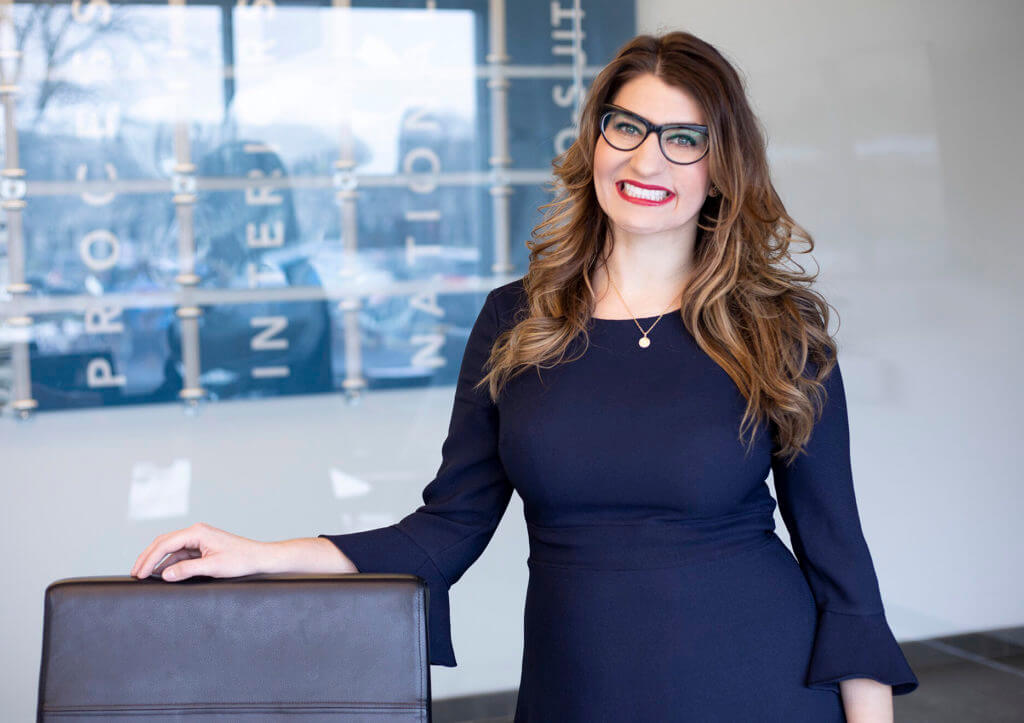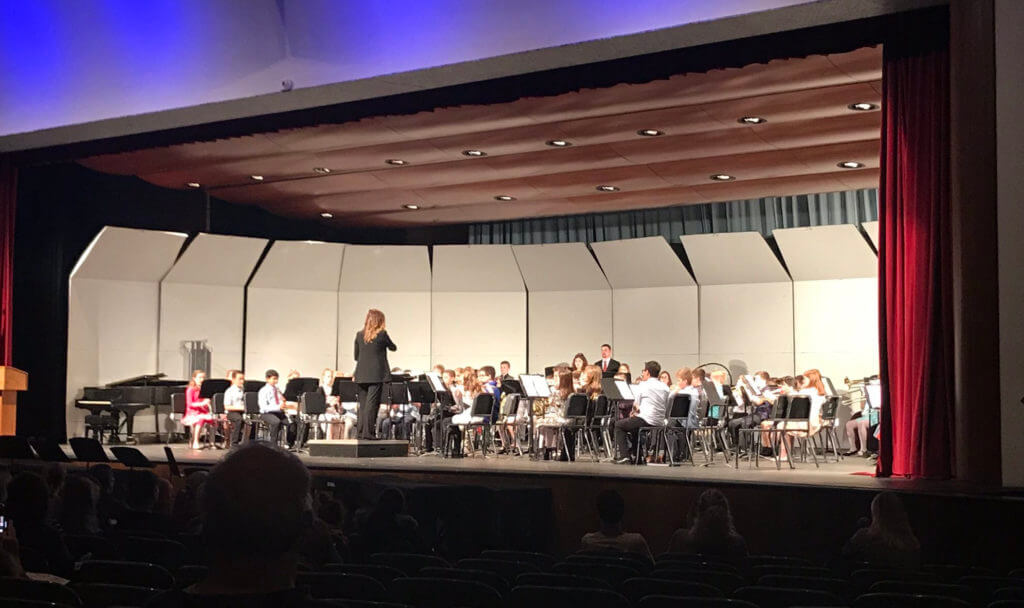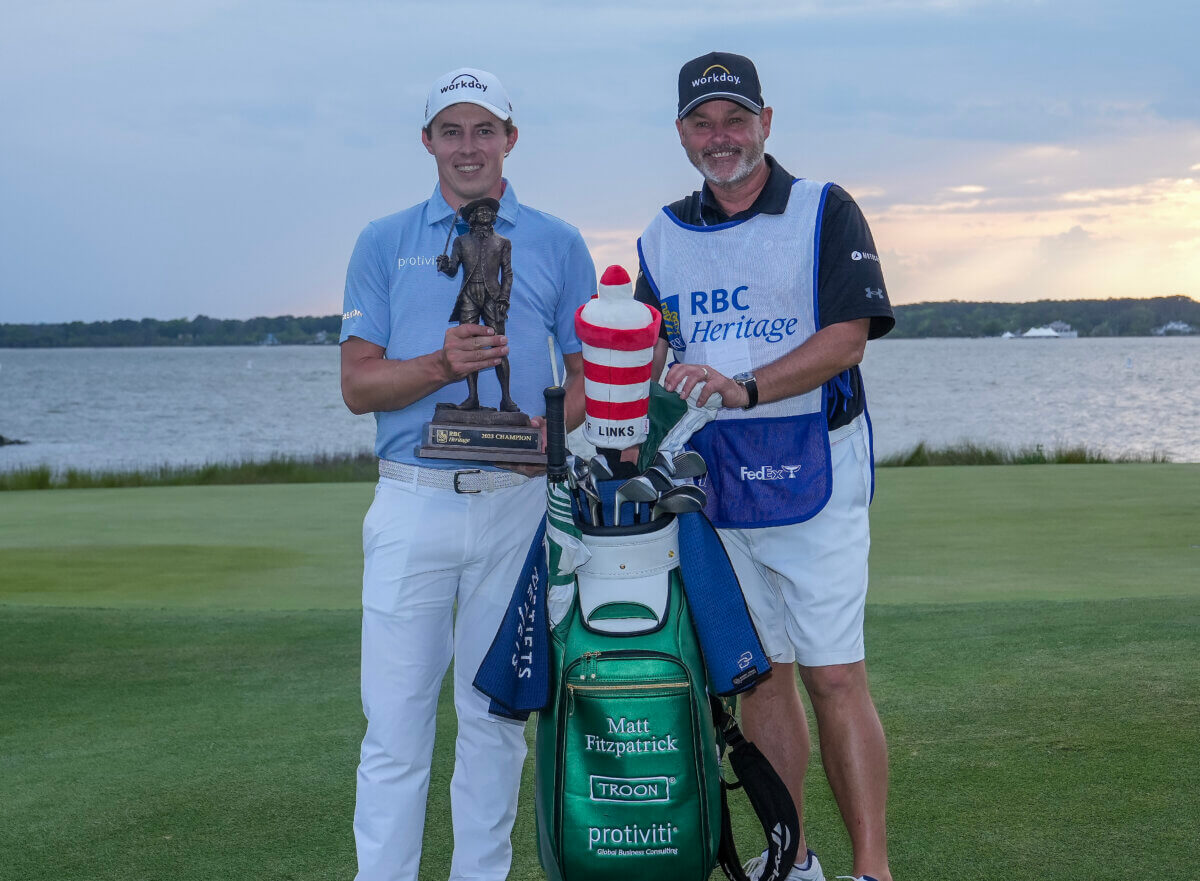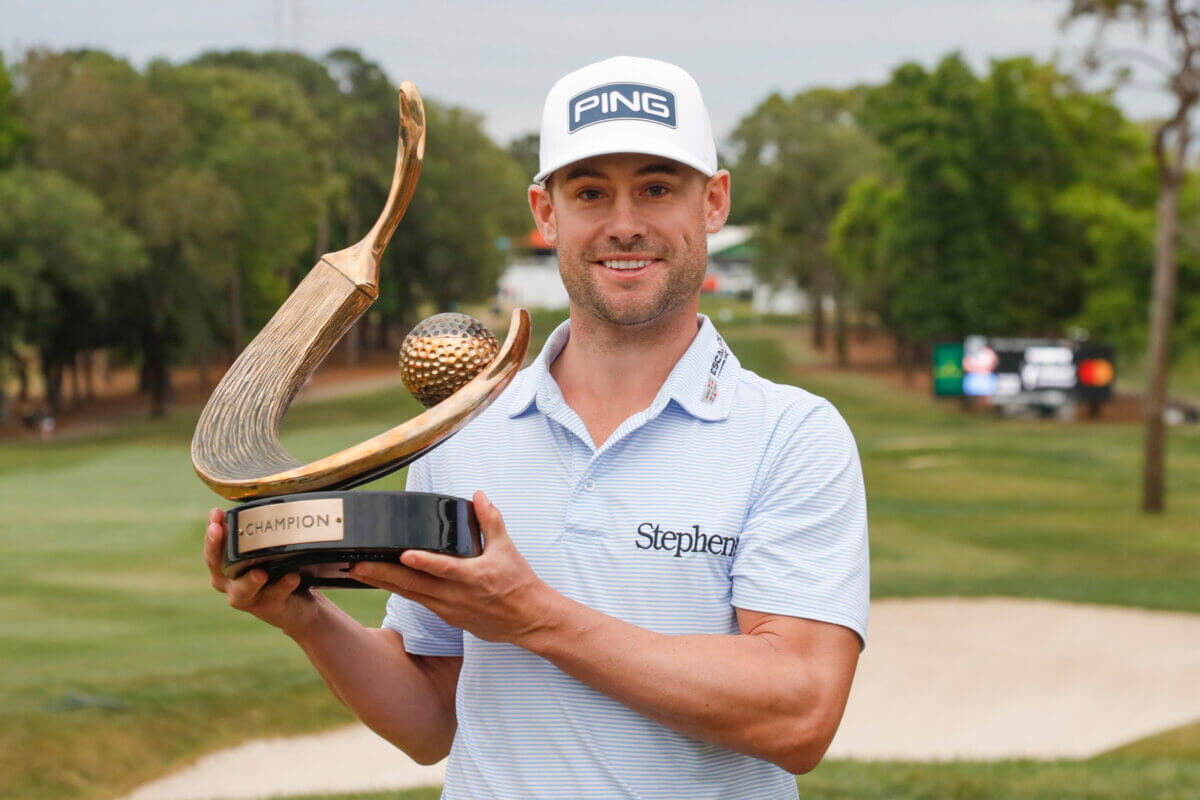Evans Scholar Julie Syperek: From caddie at Medinah to school band director

Julie Syperek treats her job of teaching children the magic of music with the same dedication and determination that she showed handing golf clubs to the likes of Carlton Fisk, Ernie Banks and other well-known celebrities and decision-makers at Medinah Country Club during her days as a teenage caddie. The lessons she learned then have a direct impact on the lessons she imparts to her students now.
You never know how, when or where you might make a difference in someone’s life. But Syperek realized early on, finding commonalities and understanding how to communicate well allows for greater achievement than any one person can do alone.
Those are things that she learned as a caddie, carried her through her time at the University of Illinois as an Evans Scholar, and allowed her to be selected as a recipient of an Award of Excellence in the Faculty/Certified Staff category as part of the 2019 Distinguished Service Awards Program sponsored by the Illinois Chapter of the National School Public Relations Association.
EVANS SCHOLAR BRION JOHNSON: From caddie to Chief Investment Officer at The Hartford
One day at her grandfather’s home, one of his friends who worked at Medinah Country Club had Syperek and her older sister try on his golf bag for size, to see if they might be able to handle working as caddies. There weren’t many girl caddies then, and it would be hard work, but there was a college scholarship available. And the rest is history.
“It was sometime when I was in high school, maybe my sophomore year,” Syperek said in a recent telephone interview. “Someone that was friends with my grandfather had golf clubs in his trunk and he pulled them out of the truck and said to my sister and I — we were one year apart — ‘Can you guys carry this bag?’ ”
Always interested in a challenge, Syperek accepted and loved it. Plus, it was a great summer job: How can you beat being outside, walking around a famous place like Medinah every day and get paid for your trouble? And even better, work toward landing a scholarship that would allow her to get a music education degree.
“We used to get dropped off at the front of the club and then walk down through this tree-lined driveway,” Syperek recalled. “And every morning, especially as a B caddie just starting out, you never knew if you were going to get a loop that day.
“It’s an experience I will never forget just to carry the bag and be near these great people and such an amazing course for four to six hours or maybe sometimes a little bit more. You’re surrounded by such beauty and Medinah truly has that aura about it. While you’re out there, you’re just kind of looking around and taking it all in and you’re kind of awestruck when you think about all these giant trees and the giants who played there.”
RELATED: Evans Scholar Gracie DeRosa excels on the golf course and in the classroom
The club was founded in 1924 by the Medinah Shriners, who eventually built three championship courses, the most famous — No. 3 — being completed in 1928. Medinah has hosted three U.S. Opens: won by Cary Middlecoff, Lou Graham and Hale Irwin. Tiger Woods won both PGA Championships contested there. And the club hosted the 2012 Ryder Cup, when Team Europe rallied on the final day for a one-point victory.
As a softball pitcher, Syperek was a talented athlete in her own right. But she was equally musically gifted. She began playing the piano at 8 and two years later, chose to learn the French horn, an instrument she continues to play and teach at an advanced level to this day.

“I continued playing the French horn and fell in love with it and decided that’s what I wanted to do with my life,” Syperek said. “I wanted to not only play the French horn at a professional level but also I wanted to teach others and give them the musical experience that I had been given.
“I had some incredible music directors and educators teaching me and they really helped me make it a passion in my life. And I want others to have the same experience that I had and that’s why I went into teaching.”
Syperek is in her 16th year as District 44 band director in her hometown of Lombard, which allows her to take students who have never seen a musical instrument to the point where they can play well enough to perform, once four months in when they can play independent parts on a simplistic level, then again at nine months at an advanced level.
“It’s pretty unbelievable considering they just started playing nine months ago,” she said. “I know I am their teacher, but every year it never ceases to amaze me!”
MORE: Evans Scholar Josh Pearl — from caddie to Director of Sportsbook Operations
She also tutors some of her former students at the high school she attended, giving private lessons several nights a week.
“With beginning band, it’s like, ‘OK, here is a trumpet mouthpiece, here’s how you make a sound out of it and here’s how you hold the instrument,’ ” Syperek said. “Now fast forward nine months and somehow we all are playing together. … It goes from ‘Open up your case’ to ‘Everybody’s playing different parts’ in nine months. That last concert is so neat because they’ve learned so much. They don’t remember what it was like to not know anything because here they are. They just hold their instruments like they’ve been holding it their whole life.”
And that’s where Syperek’s days as a caddie harmonize, so to speak, with where she sees herself in her career and where she wants to go. She’s an innovator in taking students with challenges and finding ways to incorporate that child into the program, using the communication skills necessary to bridge the gap between classroom instructors, specialists and therapists within the school district.
“I’m grateful to that Evans Scholarship, the Medinah Country Club and my caddie master. They basically taught us how to work hard, how to treat people that are going to end up tipping you, of course. But it wasn’t just for the tips. I wanted to give them a good experience as well and I wanted to work hard for that golfer.”
Syperek has been successful enough with her inclusion strategy that she’s been asked to present her findings in the “Special Education in The Large Ensemble: Successful Strategies for your Band and Orchestra” clinic at the Midwest Band and Orchestra Clinic in December.
“I’m co-presenting with a speech pathologist and also a school psychologist, and we’re going to talk about how do we work together to make the experience better for everyone,” Syperek said. “It’s been so eye-opening and I’m so surprised inclusion is not universal. … I’m just trying to ask the question, ‘Why can’t we just include everyone with what we already have?’ but we also need support of the caseworkers, occupational therapists, physical therapists, speech pathologists, school psychologists, classroom teachers and administration.”
How does she do that? By connecting and communication, just like she did when preparing to carry the bag for a golfer she had never met before.

“One of the things that I have to do a lot in order to make things work for my students with challenges is I have to be able to connect with people, and I have to be able to kind of make that bridge between different departments,” Syperek said. “I learned that from spending four to six hours with golfers.
“I enjoyed talking to people but you also have to know your place. And you had a small amount of time to connect with someone and find something in common and that always made that time on this beautiful golf course even more memorable. That’s where it all started.”
Getting the Evans Scholarship was one challenge. But Syperek said getting accepted into the music education program at Illinois was another. First, you had to be admitted into the university, a “rigorous process,” as she puts it. But even for music education majors, you had to audition for the professor to win a spot in very select company. Talk about performing under pressure.
RELATED: Joe LaCava on Caddie Hall of Fame induction: ‘I’m overwhelmed’
“You had to prepare a solo, and an exercise in scales and things like that in an audition for the professor and he accepted four students, I believe,” Syperek said. “They treated all the French horn players as if they were going into performance and I was a music education person, but that’s how high the expectations were for playing ability.”
In addition to schoolwork, music study and her time as an Evans Scholar, Syperek still got to experience one year of playing in the Illini marching band.
“It was a wonderful experience,” she said. “There’s nothing like marching out and running onto that field in front of so many people. It was a rush.”
Teaching isn’t just showing up when the bell rings and leaving when the buses do. Syperek admits she’s always thinking about new ways to motivate her students, whether it’s driving to and from school, or in those few quiet moments in her day.
It’s hard work. But so is looping on a hot summer day at one of the nation’s most famous country clubs. And Julie Syperek wouldn’t have traded the experience for anything else. It taught her so many lessons, particularly how to treat people and stay focused.
“Even though I don’t golf, I turn on the TV and watch golf,” Syperek said. “I do feel connected to golf in such a special way. I’ve been to a couple of the tournaments and walk around and you kind of go back to that place [in your life].
“I’m grateful to that Evans Scholarship, the Medinah Country Club and my caddie master. They basically taught us how to work hard, how to treat people that are going to end up tipping you, of course. But it wasn’t just for the tips. I wanted to give them a good experience as well and I wanted to work hard for that golfer.”
For Julie Syperek, it truly was about the journey. And the dedication and determination required to see it through.
“What we all have in common is we all worked hard for all of those hours,” Syperek said. “Lots of sweating and sore muscles the next day. Maybe it was for the game of golf but it was also for the chance to get that scholarship and then who knows?
“… For the times that you carry the bag and you thought, ‘This is going to be a long day,’ at the end you made it. At the end of the day, you’re going to get to the 18th hole and then you can relax. But first you have to work hard.”
—
The Evans Scholars Program provides academic, professional and social resources that help students maintain a cumulative 3.3 GPA and 95 percent graduation rate. There are a record 985 Evans Scholars enrolled in 18 leading universities for the 2018-19 academic year, and more than 10,830 young men and women have graduated as Evans Scholars since 1930. For more information, visit https://wgaesf.org.






